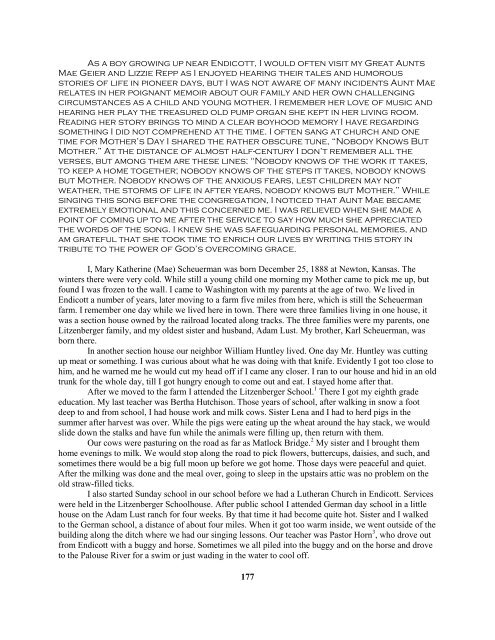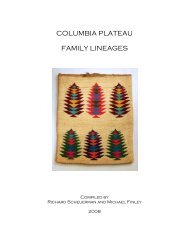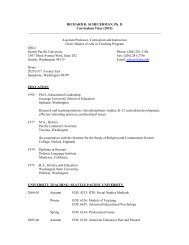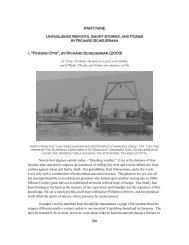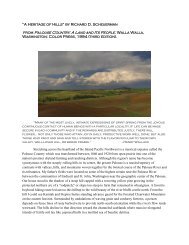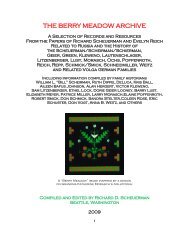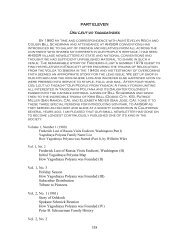PART SEVEN Oral Histories and Family Memoirs - Mountain Light ...
PART SEVEN Oral Histories and Family Memoirs - Mountain Light ...
PART SEVEN Oral Histories and Family Memoirs - Mountain Light ...
You also want an ePaper? Increase the reach of your titles
YUMPU automatically turns print PDFs into web optimized ePapers that Google loves.
As a boy growing up near Endicott, I would often visit my Great Aunts<br />
Mae Geier <strong>and</strong> Lizzie Repp as I enjoyed hearing their tales <strong>and</strong> humorous<br />
stories of life in pioneer days, but I was not aware of many incidents Aunt Mae<br />
relates in her poignant memoir about our family <strong>and</strong> her own challenging<br />
circumstances as a child <strong>and</strong> young mother. I remember her love of music <strong>and</strong><br />
hearing her play the treasured old pump organ she kept in her living room.<br />
Reading her story brings to mind a clear boyhood memory I have regarding<br />
something I did not comprehend at the time. I often sang at church <strong>and</strong> one<br />
time for Mother‟s Day I shared the rather obscure tune, “Nobody Knows But<br />
Mother.” At the distance of almost half-century I don‟t remember all the<br />
verses, but among them are these lines: “Nobody knows of the work it takes,<br />
to keep a home together; nobody knows of the steps it takes, nobody knows<br />
but Mother. Nobody knows of the anxious fears, lest children may not<br />
weather, the storms of life in after years, nobody knows but Mother.” While<br />
singing this song before the congregation, I noticed that Aunt Mae became<br />
extremely emotional <strong>and</strong> this concerned me. I was relieved when she made a<br />
point of coming up to me after the service to say how much she appreciated<br />
the words of the song. I knew she was safeguarding personal memories, <strong>and</strong><br />
am grateful that she took time to enrich our lives by writing this story in<br />
tribute to the power of God‟s overcoming grace.<br />
I, Mary Katherine (Mae) Scheuerman was born December 25, 1888 at Newton, Kansas. The<br />
winters there were very cold. While still a young child one morning my Mother came to pick me up, but<br />
found I was frozen to the wall. I came to Washington with my parents at the age of two. We lived in<br />
Endicott a number of years, later moving to a farm five miles from here, which is still the Scheuerman<br />
farm. I remember one day while we lived here in town. There were three families living in one house, it<br />
was a section house owned by the railroad located along tracks. The three families were my parents, one<br />
Litzenberger family, <strong>and</strong> my oldest sister <strong>and</strong> husb<strong>and</strong>, Adam Lust. My brother, Karl Scheuerman, was<br />
born there.<br />
In another section house our neighbor William Huntley lived. One day Mr. Huntley was cutting<br />
up meat or something. I was curious about what he was doing with that knife. Evidently I got too close to<br />
him, <strong>and</strong> he warned me he would cut my head off if I came any closer. I ran to our house <strong>and</strong> hid in an old<br />
trunk for the whole day, till I got hungry enough to come out <strong>and</strong> eat. I stayed home after that.<br />
After we moved to the farm I attended the Litzenberger School. 1 There I got my eighth grade<br />
education. My last teacher was Bertha Hutchison. Those years of school, after walking in snow a foot<br />
deep to <strong>and</strong> from school, I had house work <strong>and</strong> milk cows. Sister Lena <strong>and</strong> I had to herd pigs in the<br />
summer after harvest was over. While the pigs were eating up the wheat around the hay stack, we would<br />
slide down the stalks <strong>and</strong> have fun while the animals were filling up, then return with them.<br />
Our cows were pasturing on the road as far as Matlock Bridge. 2 My sister <strong>and</strong> I brought them<br />
home evenings to milk. We would stop along the road to pick flowers, buttercups, daisies, <strong>and</strong> such, <strong>and</strong><br />
sometimes there would be a big full moon up before we got home. Those days were peaceful <strong>and</strong> quiet.<br />
After the milking was done <strong>and</strong> the meal over, going to sleep in the upstairs attic was no problem on the<br />
old straw-filled ticks.<br />
I also started Sunday school in our school before we had a Lutheran Church in Endicott. Services<br />
were held in the Litzenberger Schoolhouse. After public school I attended German day school in a little<br />
house on the Adam Lust ranch for four weeks. By that time it had become quite hot. Sister <strong>and</strong> I walked<br />
to the German school, a distance of about four miles. When it got too warm inside, we went outside of the<br />
building along the ditch where we had our singing lessons. Our teacher was Pastor Horn 3 , who drove out<br />
from Endicott with a buggy <strong>and</strong> horse. Sometimes we all piled into the buggy <strong>and</strong> on the horse <strong>and</strong> drove<br />
to the Palouse River for a swim or just wading in the water to cool off.<br />
177


